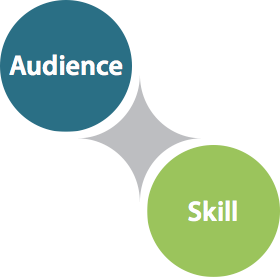 Don’t get me wrong, I love words! But if you want to become a strong public speaker, try to put them out of your mind.
Don’t get me wrong, I love words! But if you want to become a strong public speaker, try to put them out of your mind.
What??? you may be wondering. Isn’t public speaking all about words?
Not at all — and here’s the reason why:
Public Speaking Is About Meaning, Not Phrasing
Which of these three sentences do you find most “effective” (in the sense that it grabs and holds your attention, and makes you think)?
- For many, the economy is recovering too slowly.
- Our economic recovery is too slow for many people.
- The recovery? For many people, it’s too slow.
If you just scratched your head, you’re right: There is no functional difference between these sentences. Each is equally “effective.” Maybe you’re persuaded that the recovery is too slow, and maybe you’re not; but it won’t be because of the phrase I used.
Public Speaking Is About Meaning, Not Word Choice
How about these three choices?
- I’m happy to be here with you today.
- I’m thrilled to be here with you today.
- I’m delighted to be here with you today.
These three sentences also illustrate “a difference without a distinction.” Does it really matter if I say “happy,” “thrilled,” or “delighted”?
Of course not! What matters is that I mean what I’m saying — whichever word I choose — and that my audience knows it’s true.
Since Words Don’t Matter, Don’t Worry About Them
In one of those cruel ironies that fate seems to love, the more people fear public speaking, the more likely they are to fixate on trying to use the “right” word, a “good” word, or the “best” word.
Whether your audience is 1 person or 100, there are better things to think about than word choice! For example:
- Am I relaxed, and feeling connected to myself and my listeners?
- Do they seem to understand what I’m saying?
- Would it help them if I added more detail, or less? Went faster, or slower?
- Is my energy holding high? Do I need to call up the reserves?
Of course, in addition to these considerations, you’ll also be thinking about what you’re saying, and what you’re going to say next.
But don’t think about the words you’re going to say next. Think about your next idea.
Exceptions to the “Words Don’t Matter” Rule
Like every rule, this one has exceptions. There are times and places where individual words matter, and the ones that come easily to my mind are:
- Professional settings: Here, you want to use the correct “terms of art” (don’t say exfoliate if you mean defoliate)
- Tense or diplomatic situations: When tempers are running high, it’s useful to chose your words with care (“Let me respond to that” is a better lead than “You really are an idiot!”)
- If time is short, or the occasion is momentous: In these situations, you may want to script yourself to be sure that every word counts (that’s why people memorize their TEDx talks, or use a TelePrompter for official speeches).
But for the everyday types of public speaking that most of us do — pitches, presentations, speaking up in meetings, networking, etc. — acute word awareness is a hindrance to good public speaking, not a help.
As You Continue to Develop Public Speaking Skills, Remember:
- Practice talking about your ideas. Don’t practice saying words.
- If you use a word you don’t like while practicing, don’t stop and correct yourself. Keep going.
- If you use a word you don’t like while presenting, try not to freak out. Keep going.
- Stay focused on your listeners, and whether they seem to understand what you’re saying. Remember Jezra’s 1st Law:
If you’re talking and they’re listening… you’re doing it right!
Words have their place in public speaking, but it’s a much smaller place than most people assume. So instead of worrying about individual word choices, focus on your ideas and your connection with the audience.
Forget the words.

